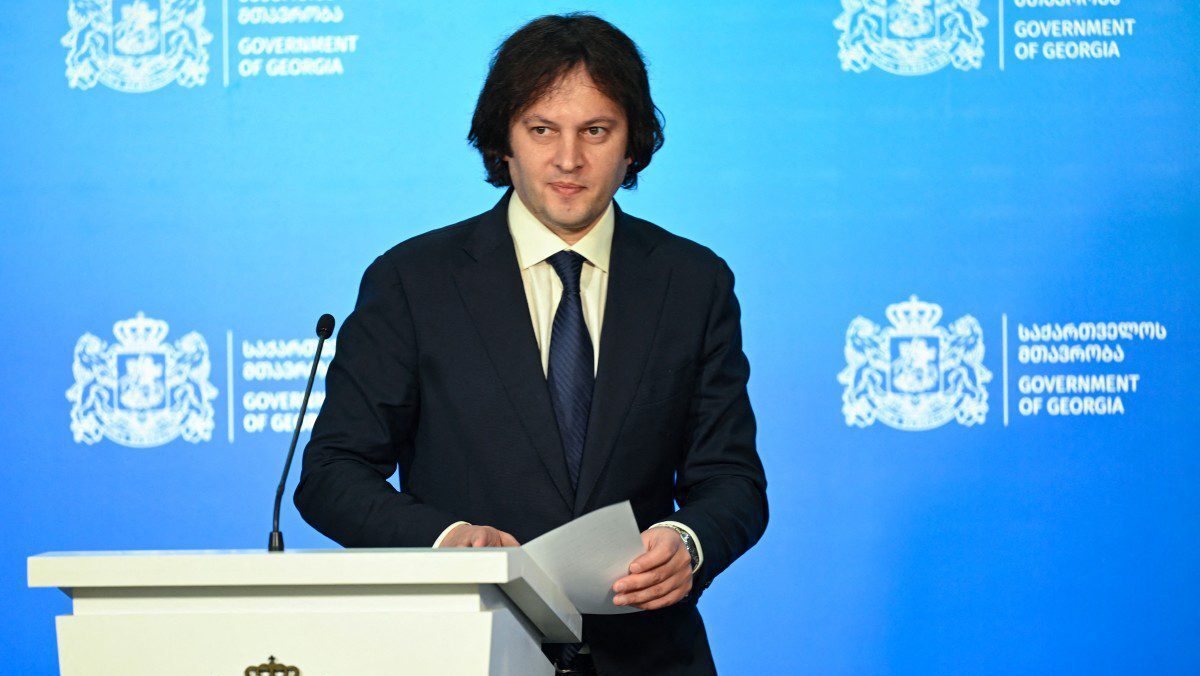
Georgian Prime Minister Irakli Kobakhidze holds a briefing in Tbilisi on December 4, 2024
Photo: Vano SHLAMOV / AFP
Hungary and Slovakia have vetoed a proposal to impose EU sanctions on Georgian officials in response to a crackdown on protesters.
Hungarian Foreign Minister Péter Szijjártó called the proposed move a “political hypocrisy,” saying that Brussels is targeting Georgia for the simple fact that “a peace-oriented, patriotic, conservative party” won the recent elections instead of liberal forces.
🇪🇺🇬🇪 "The European Union has set a world record for political hypocrisy regarding Georgia," said FM Péter Szijjártó after vetoing proposed sanctions against Georgian police leaders with his Slovak counterpart. He criticized Brussels for targeting Georgia simply because "a… pic.twitter.com/S41BDaiQpB
— Zoltan Kovacs (@zoltanspox) December 16, 2024
Slovakian Foreign Minister Juraj Blanár emphasised that “Slovakia respects countries that choose their own path,” and “we do not want to interfere with the results of the elections in Georgia.”
The leftist-liberal elite in Brussels has been adamant in trying to punish the ruling conservative party in Georgia, an EU candidate country, ever since it ruled out following the EU line on Russian sanctions. Georgia has also drawn the ire of Brussels for adopting a law that aims to safeguard traditional family values by outlawing same-sex marriage, adoption by same-sex couples, and the promotion of LGBT ideology in schools.
The ruling party, Georgian Dream, which has been in power for the past twelve years, won the parliamentary elections at the end of October against a coalition of so-called “pro-EU” parties, prompting Brussels to call the vote illegitimate, even though international observers—while mentioning alleged violations—did not find any substantial evidence for the elections being rigged.
At the end of November, Prime Minister Irakli Kobakhidze halted the country’s EU membership bid until the end of 2028, after EU lawmakers condemned October’s parliamentary election result and demanded a rerun. He called Brussels’ move a “shameful and offensive blackmail” and “woke overreach” in Georgia’s domestic affairs.
Despite being regularly labelled a “pro-Russian” party, Georgian Dream has only strived to maintain a pragmatic relationship with its neighbour, Russia, while pursuing accession to the European Union.
The country applied for EU membership two years ago and was granted candidate status in December of last year, but Brussels itself froze the accession process earlier this year after the country’s parliament voted in favour of a foreign interference law, which obliges NGOs and media outlets receiving more than 20% of their funding from abroad to register as “pursuing the interests of a foreign power.”
The government’s decision to suspend the pursuit of EU accession provoked anger among opposition voters who have been protesting on the streets of the capital Tbilisi in recent weeks. They have blocked roads and attempted to storm the parliament. Police have used force in their attempts to break up the rallies.
The EU’s new foreign affairs chief, former Estonian prime minister Kaja Kallas, proposed sanctioning “Georgian officials who are behind the violence against peaceful protesters,” but the proposal was vetoed on Monday, December 16th, by the foreign ministers of Hungary and Slovakia. Both countries have called out the hypocrisy of the EU for only wanting to punish conservative governments that are unwilling to give in to EU dictates.
“No one in Brussels has the right to question the will of the Georgian people,” Péter Szijjártó emphasised, pointing to Georgian Dream’s clear election victory.
Kaja Kallas found the rejection of her proposal hard to swallow, and mocked Budapest by saying: “It’s my first Hungarian veto, but I can guarantee it’s not the last.”
The foreign affairs chief did manage to push through a suspension of visa-free travel for Georgian officials holding diplomatic passports, as that decision required only a qualified majority at the foreign affairs ministers’ meeting on Monday.
Irakli Kobakhidze on Tuesday called the move “an unequivocally anti-Georgian step,” adding that “it is precisely such decisions that reduce the trust of the Georgian public in European bodies.”
Irakli Kobakhidze: I want to thank the five countries that voiced a position in support of the Georgian people at the Council of the European Union. These are 🇭🇺 Hungary, 🇸🇰 Slovakia, 🇮🇹 Italy, 🇪🇸 Spain, and 🇷🇴 Romania. They defended the interests of the Georgian people at the… pic.twitter.com/E0VfzsgCKx
— Georgian Government (@GovernmentGeo) December 17, 2024
Although only Hungary and Slovakia are known to have vetoed any further sanctions, the prime minister also thanked Italy, Spain, and Romania for “defending the interests of the Georgian people” at the Council meeting. He claimed that the list of countries that had opposed the sanctions against Georgian officials was “even wider.”
